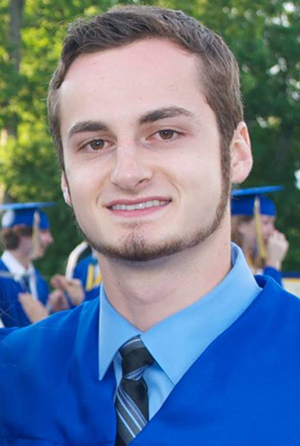 Alex was awarded $1,050 by FFRF for his essay.
Alex was awarded $1,050 by FFRF for his essay.
Certain areas of society have been ambushed by religion and appear to be past the point of no return. One of the foremost areas in which this has happened in sports, especially American football. Tim Tebow publicly broadcasts the heavy influence of Christianity on football, but it has existed and continues to exist without his theatrical sideline prayers.
Last fall was my senior season and also my last time ever playing organized football. My team and I performed well, finishing eighth in the state of Michigan. I was awarded the Southeastern Conference Sportsmanship Award and an All-League Honorable Mention certificate.
The Fellowship of Christian Athletes may want people to believe that our success came from the fact that 95% of my football team was composed of white Christian athletes who pointed up at the sky after every touchdown and tackle, but I would not agree with them.
I never participated in the team’s pregame prayers or received help from an invisible hand, and I still achieved goals and exceeded expectations. As a linebacker, it took knowledge of the game and quick reaction times to tackle opposing runners at the line of scrimmage, not prayers to God asking that I play well.
Throughout my high school football years, it always astounded me that pregame prayers were the norm in a locker room two minutes before the start of a game. I see them as an obvious declaration of bigotry. I was always even more surprised to see the glaring faces of those who looked back at me as I stood aside from the remainder of my team while they knelt and prayed.
I never joined them because I do not believe in the prayers they were reciting and found praying to be a narrow-minded approach to promoting team unity before a game. How is a group of young boys supposed to feel like a team, a band of brothers, if they are segregated into Christian and non-Christian players two minutes before the start of a game? How could I trust my teammates to have my back if they were upset at my not joining team prayer? How could they trust me?
Pregame prayers have been one of the most difficult things to face as a young atheist, and I always resented the fact that my team would look upon me as an outsider before we went into battle together.
As hard as it was to play together in the face of such enormous cognitive separation, I would not let it affect the way I handled myself during the game. I perceived the situation not as an excuse to play poorly but as a test of my character to overcome adversity and prove to my teammates that I could succeed without religion. I showed respect for my teammates and their beliefs, and I proved that I had their backs on the field despite our differences.
Eventually, my teammates came to respect my lack of belief. I have learned a lot about other people from being in the spiritual minority, but I have also learned a great deal about myself: I have the ability to think freely and act according to rational beliefs based on logic and reason, rather than conforming to the beliefs of the masses.
The fact that I am a freethinker pushes me to succeed so I can prove that I have the capability to make my own decisions and live a fulfilling life without belief in a “greater” being.
Alex Kendig, 17, Saline, Mo., will be attending the University of California at Los Angeles to major in business economics and minor in music industry.

